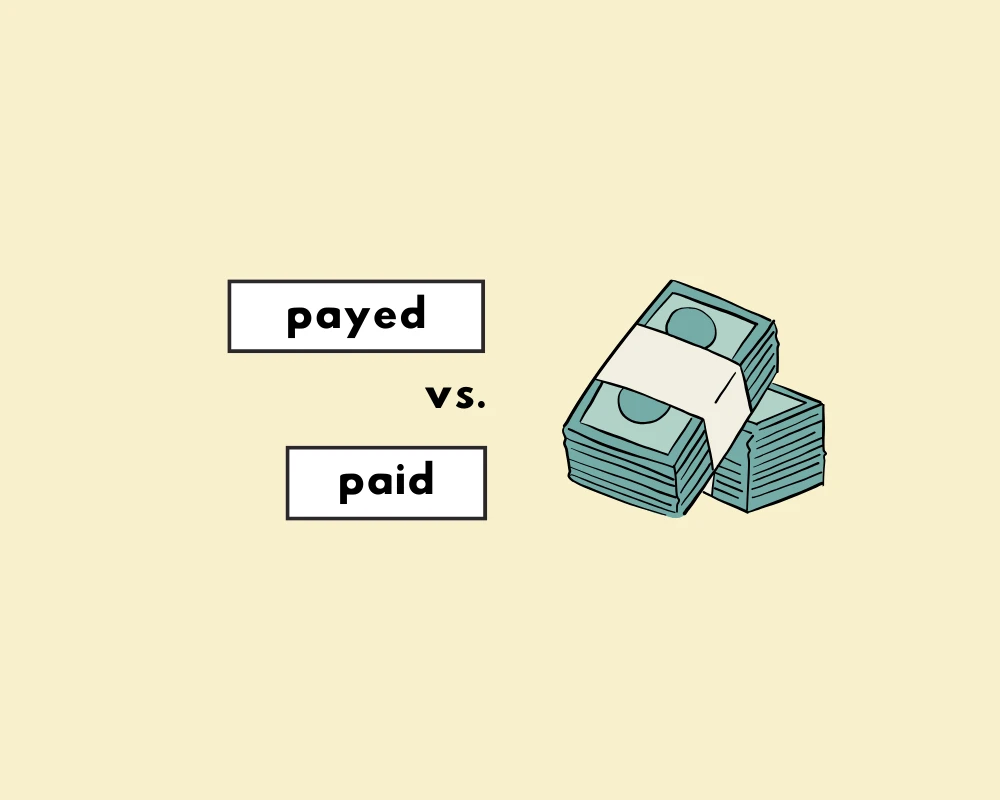What is the correct past tense of “pay”?
The verb pay, which describes giving money to someone for something you want to buy or for services provided, has two correct past tenses: payed and paid.
I paid for the groceries.
The sailor payed out the anchor chain.
She pay her bills yesterday.
He payd for his ticket.
Is “I have paid” the correct phrase?
Either paid or payed can be used to refer to the past tense of pay, though ‘paid’ is the more common spelling. Regardless, both “I have paid” and “I have payed” use correct English.
Pay/paid, synonyms
- allowance
- compensation
- fee
- income
- payment
- profit
- reimbursement
- remuneration
- reward
- salary
- stipend
- wage
Verb forms of pay
| present | past | future | |
|---|---|---|---|
| simple | I pay | I paid (or payed) | I will pay |
| continuous | I am paying | I was paying | I will be paying |
| perfect | I have paid (or payed) | I had paid (or payed) | I will have paid (or payed) |
| perfect continuous | I have been paying | I had been paying | I will have been paying |
12 verb tenses of ‘pay‘.
“paid” vs. “payed,” associate “paid” with money (I *paid* for groceries) and “payed” with ropes/cables (sailors *payed* out the anchor).
Pay/payed/paid, used in sentence examples
| Examples: “pay”, used in sentences |
|---|
| You have to pay extra for a single room.
Many consumers are willing to pay more for better service. How much did you pay for your new car? I would gladly pay for the benefits such a tax would bring. The revenue will be used to help pay for environmental improvements. |
| Examples: “paid”, used in sentences |
|---|
| Her parents paid for her to go to Canada.
The union paid all her legal costs. He still hasn’t paid me the money he owes me. Membership fees should be paid to the secretary. |
Worksheet: tenses of pay
| Questions | Answer options: |
|---|---|
| 1. True or false: “Pay” is a regular verb. | a. true b. false c. both |
| 2. True or false: Pay looks the same in the past tense as it does in the present. | a. true b. false |
| 3. Choose the correct tense: I paid the driver in cash. | a. simple present b. simple past c. past perfect d. present perfect |
| Choose the correct verb form to complete the sentences: | |
| 4. I pay my taxes. | a. simple present b. simple past c. past perfect d. present perfect |
| 5. How much did you ____ for the tickets? | a. paidb. payingc. paysd. pay |
Answers
- b
- b
- b
- c
- a
- d
The origin of pay
From etymonline on pay (v.):
|
c. 1200, paien, “to appease, pacify, satisfy, be to the liking of,” from Old French paier “to pay, pay up” (12c., Modern French payer), from Latin pacare “to please, pacify, satisfy” (in Medieval Latin especially “satisfy a creditor”), literally “make peaceful,” from pax (genitive pacis) “peace” (see peace). |
Learn more about verbs
| Commonly misused words | UK English vs. US English |
|---|---|
| former vs. latter | burned or burnt? |
| bear with vs. bare with | color or colour? |
| breathe or breath | favorite vs. favourite |
| compliment vs. complement | smelled or smelt? |
| effect vs. affect | gray or grey? |
| elude or allude | favor vs. favour |
| it’s or its | analyze or analyse? |
Worksheet
What is the standard past tense of “pay” when referring to monetary transactions?
Which past tense form of “pay” is used for letting out ropes or cables, such as an anchor chain?
According to the blog post, is “payed” ever a correct past tense form of “pay”?
For monetary payments, which past tense form is noted as being more common?
Which option represents an incorrect spelling of a past tense form mentioned in the post?
She for the groceries yesterday.
The crew out the anchor chain.
He hasn’t me back yet.
I have already the bills.
The sailor carefully out the line.
FAQs
What’s the correct past tense of pay?
+
When do I use ‘paid’?
+
When do I use ‘payed’?
+
Is “I have paid” correct usage?
+
What’s a common ‘pay’ mistake?
+
Yash, D. "Is “Paid” or “Payed” Correct?." Grammarflex, Jun 25, 2025, https://www.grammarflex.com/is-paid-or-payed-correct/.
Sources
-
Harper, Douglas. “Etymology of pay.” Online Etymology Dictionary, https://www.etymonline.com/word/pay. Accessed 1 April, 2024.










